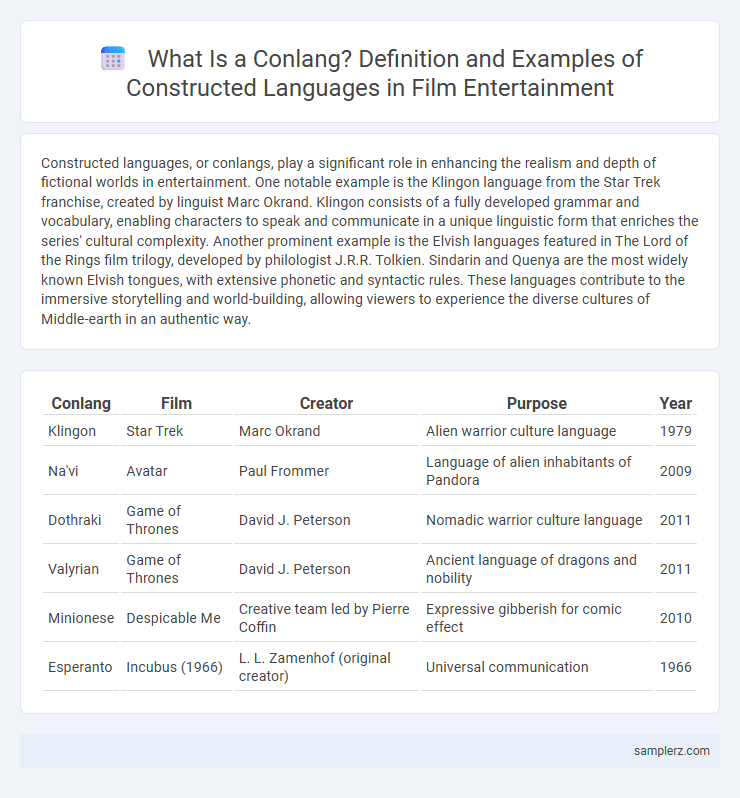Constructed languages, or conlangs, play a significant role in enhancing the realism and depth of fictional worlds in entertainment. One notable example is the Klingon language from the Star Trek franchise, created by linguist Marc Okrand. Klingon consists of a fully developed grammar and vocabulary, enabling characters to speak and communicate in a unique linguistic form that enriches the series' cultural complexity. Another prominent example is the Elvish languages featured in The Lord of the Rings film trilogy, developed by philologist J.R.R. Tolkien. Sindarin and Quenya are the most widely known Elvish tongues, with extensive phonetic and syntactic rules. These languages contribute to the immersive storytelling and world-building, allowing viewers to experience the diverse cultures of Middle-earth in an authentic way.
Table of Comparison
| Conlang | Film | Creator | Purpose | Year |
|---|---|---|---|---|
| Klingon | Star Trek | Marc Okrand | Alien warrior culture language | 1979 |
| Na'vi | Avatar | Paul Frommer | Language of alien inhabitants of Pandora | 2009 |
| Dothraki | Game of Thrones | David J. Peterson | Nomadic warrior culture language | 2011 |
| Valyrian | Game of Thrones | David J. Peterson | Ancient language of dragons and nobility | 2011 |
| Minionese | Despicable Me | Creative team led by Pierre Coffin | Expressive gibberish for comic effect | 2010 |
| Esperanto | Incubus (1966) | L. L. Zamenhof (original creator) | Universal communication | 1966 |
Iconic Constructed Languages in Blockbuster Movies
Iconic constructed languages in blockbuster movies like Klingon in "Star Trek," Dothraki and High Valyrian in "Game of Thrones," and Na'vi in "Avatar" showcase the creative depth of fictional worlds. Crafted by linguists and creators, these conlangs add authenticity and cultural richness that enhance audience immersion. Their detailed grammar and vocabulary demonstrate how language shapes identity in cinematic storytelling.
Memorable Conlangs That Defined Film Worlds
Klingon from the Star Trek franchise revolutionized sci-fi with a fully developed language, enriching the cultural depth of its universe. Na'vi, crafted for James Cameron's Avatar, combined unique phonetics and grammar, immersing audiences in Pandora's alien society. Dothraki and High Valyrian in Game of Thrones showcased linguistic creativity that enhanced world-building and character authenticity.
Noteworthy Movie Conlangs and Their Creators
Klingon, crafted by linguist Marc Okrand for the Star Trek franchise, exemplifies a complex conlang with a fully developed grammar and vocabulary used by fans worldwide. The Na'vi language, developed by Dr. Paul Frommer for James Cameron's Avatar, incorporates unique phonetics and cultural depth, enhancing the immersive experience of Pandora's alien world. Dothraki and High Valyrian, invented by linguist David J. Peterson for Game of Thrones, feature intricate syntax and vocabulary, contributing to the series' rich fantasy universe and fan engagement.
Influence of Conlangs on Cinematic Storytelling
Conlangs such as Klingon in Star Trek and Dothraki in Game of Thrones have deeply influenced cinematic storytelling by enriching world-building and character development. These constructed languages create immersive cultural contexts that enhance narrative authenticity, fostering stronger audience engagement. Their use demonstrates how linguistic creativity can shape plot dynamics and deepen emotional resonance within film and television.
Groundbreaking Conlangs in Science Fiction Films
Klingon, created by linguist Marc Okrand for the Star Trek franchise, revolutionized the use of constructed languages in science fiction films, offering a fully developed grammar and vocabulary that enriched the narrative depth. Another pioneering conlang is Na'vi from James Cameron's Avatar, designed by linguist Paul Frommer, which contributes cultural authenticity and immersive realism to the alien world of Pandora. These groundbreaking conlangs serve not only as artistic expressions but also enhance storytelling by adding linguistic complexity to fictional universes.
Popular Fantasy Films with Invented Languages
Popular fantasy films such as *The Lord of the Rings* and *Avatar* feature iconic constructed languages like Elvish and Na'vi, enriching their immersive worlds. The Klingon language from *Star Trek* and Dothraki from *Game of Thrones* also serve as standout examples of conlangs enhancing character depth and cultural authenticity. These invented languages contribute significantly to storytelling by providing a unique linguistic identity that captivates audiences globally.
How Filmmakers Use Conlangs for World-Building
Filmmakers utilize constructed languages (conlangs) like Klingon in "Star Trek" and Na'vi in "Avatar" to deepen the immersive experience by adding cultural authenticity and complexity to fictional worlds. These languages, developed with detailed grammar and vocabulary, enable richer character interactions and enhance the narrative's believability. Conlangs serve as a critical tool in world-building, making fantastical settings feel tangible and lived-in for audiences.
Actor Performances Enhanced by Constructed Languages
Constructed languages like Klingon in Star Trek and Na'vi in Avatar significantly enhance actor performances by providing authentic linguistic frameworks that deepen character immersion. Actors learn phonetics and syntax, enriching emotional expression and cultural nuance within their roles. This linguistic authenticity elevates storytelling, offering audiences a more believable and engaging film experience.
Challenges of Developing Conlangs for the Big Screen
Creating constructed languages (conlangs) for films like Klingon in Star Trek or Dothraki in Game of Thrones involves balancing linguistic complexity with audience accessibility. Filmmakers face the challenge of crafting authentic phonetics and grammar that actors can learn while ensuring the language supports storytelling and character development. Limited screen time and the need for memorability add constraints to developing fully functional languages suitable for cinematic use.
Fan Communities Inspired by Movie Conlangs
Movie-created conlangs like Klingon from "Star Trek" and Dothraki from "Game of Thrones" have fostered vibrant fan communities dedicated to language learning and cultural exchange. These fan groups organize conventions, develop online courses, and create original content such as fan fiction and multimedia projects using the conlangs. The engagement around these constructed languages enhances fan immersion and contributes to the cultural impact of the films and TV shows.

example of conlang in film Infographic
 samplerz.com
samplerz.com